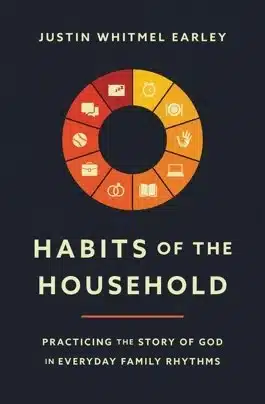This is the first in a series on school-family partnership. We’re seeking responses to the following question: “How can families support and continue the life-giving education their children receive daily at Clapham?” Please contact Adam Beyer if you have contribution ideas!
Book Recommendation
Habits of the Household by Justin Earley

“My habits are forming me into a certain kind of parent. My parenting is forming them into certain kinds of children. We are all, together, forming each other into a certain kind of family. There is no escaping habits and formation in the family. We become our habits, and our kids become us.”
Justin Earley, Habits of the Household
When my family entered the Clapham community four years ago, our understanding of Charlotte Mason-inspired Christian classical education was limited. Each year we’ve endeavored to learn a bit more about this model to better partner with our school. We’re taking time this year to further understand and support Clapham’s practice of habit cultivation.
Recently, we’ve been inspired by the book Habits of the Household: Practicing the Story of God in Everyday Family Rhythms by Justin Earley. Though Earley does not refer to classical education or Charlotte Mason, his reflections on habit formation echo Clapham pedagogy. While a full treatment of Habits of the Household is beyond the scope of this piece, below is a recap of the Introduction and a preview of subsequent chapters.
Earley writes that habits are things we do over and over, semiconsciously and unconsciously. Though little “the aggregate impact of habits is as big as each habit is small.” They occur in the deepest parts of our brains on autopilot to allow for more complex thought to take place elsewhere. Yet “the same feature that allows us to perform a good habit without thinking about it makes it hard to change a bad habit… Good or bad, a rut is a rut, and our brains love ruts.”
He elaborates that habits are not just neurologically formative—they are spiritually formative. Our hearts follow our habits, and habits can only change through practice. “Habits are kinds of liturgies. They are little routines of worship, and worship changes what we love. Habits of the household are not just actions that form our families’ routines, they are liturgies that form our families’ hearts.”
Attentiveness to our communal habits is nothing new, he explains. The ancient monastic term for this idea is a rule of life, “a pattern of shared habits intended to shape a community,” much like a trellis facilitates the growth of a plant. Christian communities have long realized that “if they didn’t shape their trellis of habit, the world would shape one for them.”
The remainder of the book devotes a chapter each to practicing household habits in the areas of waking, mealtimes, discipline, screentime, family devotions, marriage, work, play, conversation, and bedtime. Chapters are structured in three directions: forming parents, forming children, and forming a family. Explaining this threefold shape, Earley emphasizes that parenting “is first about the work God is doing in your life. This means the starting point of parenting habits is thinking about how our household habits are forming us as parents. We can’t make disciples without being disciples.”
For those Clapham families desiring to partner with our school in cultivating good habits, you’ll likely find Habits of the Household of much benefit. Earley holds that “the greatest spiritual work happens in the normal moments of domestic life” and “parenting, seen properly, is an unceasing spiritual battle.” Amen! Thanks be to God for books like these which aid us in this good fight.

Adam is married to Elizabeth and they have three children: Addie (C4), Isaiah (C1), and a toddler, Theo.
